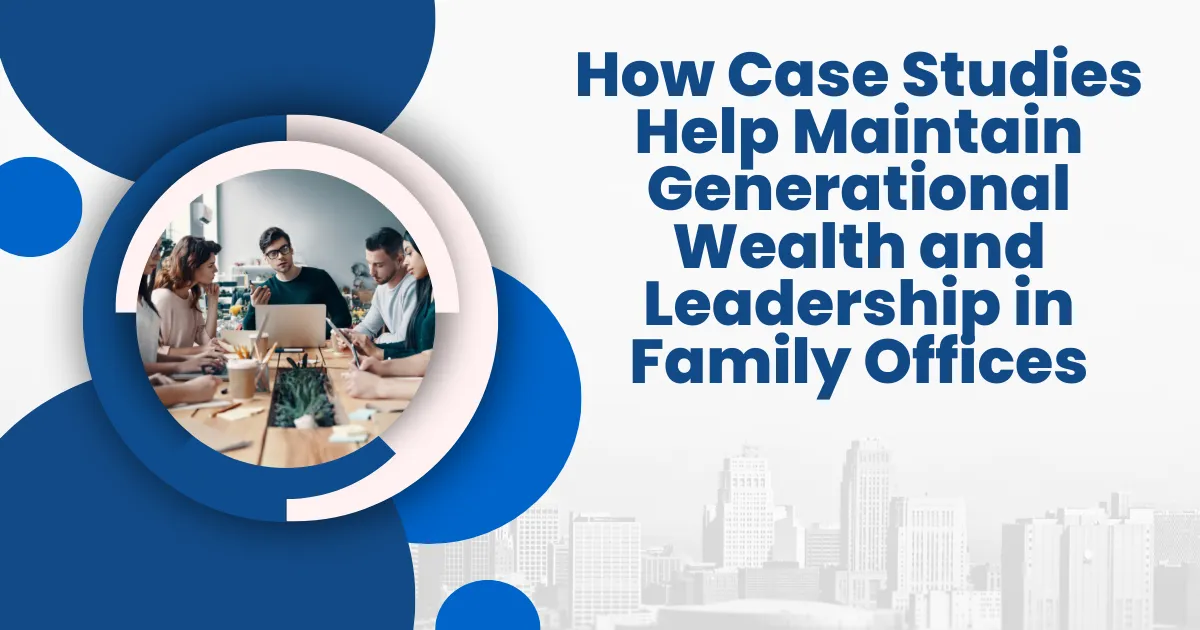WHAT FORE MEMBERS ARE SAYING
" What is currently considered as constituting an alternative or a hedge fund? What do these entities serve as alternatives to, and against what risks do they act as hedges? "
MEMBER LINK
Community | Education | Legacy
FAMILY OFFICE REAL ESTATE INSTITUTE BLOG
The Latest on Family Offices and Real Estate, At the Family Office Real Estate Institute, our commitment to advancing knowledge and expertise in real estate management within family offices extends beyond the classroom.
MEMBER LINK
Community | Education | Legacy

How Case Studies Help Maintain Generational Wealth and Leadership in Family Offices
Family offices are private offices established by wealthy families to manage their financial wealth, internal family planning, and other family-owned assets. The primary goal of the office of the family is to maintain and grow the family's support for the benefit of the owning family and their future generations.
As a family business grows and expands, a family office helps ensure that the next generation of family members is prepared to take over the leadership role and maintain the office of the family, the value of the economy and status quo becomes essential. This is where case studies come in. In this article, we will explore how case studies can help maintain generational wealth and leadership in the offices of the family and how they can benefit members of the family and the family business as a whole.
The Role of Case Studies in Executive Education
Case studies are a method of teaching and learning in which real-world scenarios are analyzed to gain insight into business decision-making processes. They provide a detailed account of a particular situation, the challenges involved, and the decision-making process undertaken by those involved. Case studies often include financial data, resources, and information about the individuals and teams responsible for certain decisions. They help individuals develop a deeper understanding of business management, strategy, and leadership complexities and are widely used in executive education programs to provide participants with practical skills and knowledge.
Benefits of using case studies in executive education:
Using case studies in executive education offers a variety of benefits for individuals and organizations. Firstly, case studies provide a practical and relatable approach to learning intricate business concepts. Participants can see how these concepts apply to real-world situations and gain a better understanding of their application. Additionally, case studies encourage teamwork and collaboration as participants work together to analyze and discuss the case. This fosters a collaborative learning environment and encourages participants to share their diverse perspectives.
Moreover, case studies help improve critical thinking skills and apply research and data to support decision-making. They can be used to improve leadership skills by examining the decisions and actions taken by successful leaders in real-world situations. Participants can learn from other's mistakes and successes and apply these lessons to their duties and roles. Furthermore, case studies are an excellent tool for employee development and can be used to identify and develop talent within an organization.
Additionally, case studies can help individuals understand the impact of their decisions on the larger community and society. They can help develop a perception of responsibility and accountability among individuals, especially those in leadership positions.
Furthermore, case studies provide a deeper understanding of the business world and can help individuals make more informed decisions. They are effective tools for developing problem-solving and decision-making skills. Moreover, case studies can help improve cross-functional understanding and knowledge among teams and individuals. They provide an opportunity to examine case studies from different regions and industries, broadening understanding of the world. Finally, case studies are an excellent way to develop a perception of social responsibility and community impact among participants.
Some examples of case studies that can be used in executive education include examining the leadership decisions of companies during crises, such as the BP oil spill, or analyzing the success of companies such as Amazon or Apple. Case studies can also be used to examine the impact of changing technologies or consumer behavior on industries such as retail or entertainment. Ultimately, using case studies in executive education provides a valuable and effective approach to learning complex business concepts and improving leadership and decision-making skills.
Some Examples
The Harvard Business School Executive Education program offers a variety of courses that use case studies to improve leadership skills and management strategies, such as the "Advanced Management Program" and the "Owner/President Management Program."
The Wharton School at the University of Pennsylvania offers an Executive Education program that uses case studies to improve financial and investment management skills.
The Thousand Oaks Institute offers courses that use case studies to improve team management, conflict resolution, and decision-making skills.
The Stanford Graduate School of Business offers a range of executive education programs that use case studies to improve a sense of social responsibility and community impact among its participants, such as the "Executive Program in Social Entrepreneurship".
INSEAD Executive Education offers courses that use case studies to improve cross-cultural understanding and global management skills, such as the "Leading Across Borders and Cultures" program.
The Family Office Real Estate Institute offers a range of executive education programs that use case studies to learn from past family mistakes and successes as well as case studies to learn real estate investing.
Case Studies in Family Office Executive Education
Family offices are essential entities for wealthy families worldwide. As such, the office of the family executives must have a comprehensive and deep understanding of their clients' needs, wealth management strategies, and more. With that in mind, Below we will explore case studies in family office executive education and how these programs can be leveraged further to improve the skills of executives within the offices of the family.
Specific challenges facing family offices
Family offices face unique challenges that can be intricate and difficult to navigate. These challenges include managing the family's financial assets and investments and maintaining human relations within the family. And, they are ensuring the leadership in effecting way and governance of the family office. In addition, the offices of the family must consider succession planning to ensure the continued improvements in the family business value and the preservation of the family's wealth and legacy.
How can case studies help family office executives develop skills and knowledge in succession planning, governance, and risk management?
Case studies are an effective way to help family office executives develop skills and knowledge in areas such as succession planning, governance, and risk management. These areas are crucial for a family office's long-term success and for preserving the family's wealth and legacy.
One way that case studies can be beneficial is by providing a practical understanding of the various challenges faced by the offices of the family. For example, an analysis of the case might focus on the implications of selling a family business. It includes the impact on the person of the family's personal and financial interests. By examining the study of the case, family office executives can gain insights into such a decision's potential risks and benefits and improve strategies to mitigate any negative consequences.
Another way that case studies can be useful is by providing access to other types of skills and knowledge that can lead to success. Case studies can help a person of family office executives better understand intricate financial concepts and investment strategies and provide insight into effective leadership and governance practices.
A Case study can also provide an opportunity to examine case studies from different regions and industries, broadening the executives' understanding of the world and how it impacts their family office.
Furthermore, case studies can support the development of succession planning strategies by providing samples of successful transitions and highlighting potential pitfalls to avoid. They can also help family office executives improve a sense of responsibility and accountability among family members, especially those in leadership positions, and foster a culture of transparency and communication.
Case studies are an effective tool for family office executives to improve skills and knowledge in areas such as succession planning, governance, and risk administration. By providing a practical understanding of intricate concepts and real-world samples, case studies can help family office executives make informed decisions and achieve long-term success for the owning family and their future generations.
Case studies used in family office executive education programs
1. A case study focused on family members who are interested in working in the family office or taking on leadership roles. This case study could explore the challenges of balancing personal interests with the family office's needs. And how to effectively manage and improve family members in these roles. It could also examine the wealth benefits of involving members of the family in the family office, such as maintaining the family's culture and values, and highlight potential pitfalls to avoid.
2. A case study focused on the impact of real estate investments on the family's assets and economic value. This case-type study could explore the potential wealth benefits and risks of private-type equity investments. It includes the impact on the family's long-term financial wealth. It could also examine the office's role in evaluating and managing real estate investments, including due diligence and risk administration strategies.
3. A case study focused on maintaining the status quo of the office and the family's assets over the long term. This case-type study could explore the challenges of balancing the needs of current family member needs with generations' needs. And how to create a governance structure that supports common goals across the organization. It could also examine strategies for preserving the family's culture and values over time and highlight the importance of effective leadership and communication in achieving these goals.
Benefits of Using Case Studies in Family Office Executive Education
Family office executive education can give value from the use of case studies in several ways:
1. Real-world application
One of the significant benefits of using case studies in the office of the family executive education is that they provide a real-world application. Family offices can be highly intricate, especially when family members have a personal interest in the business or own assets.
Case studies offer a practical and realistic view of the challenges that arise in these circumstances. Family office executives can analyze and learn from actual scenarios that other offices of the families have experienced, helping them apply this knowledge to their own situations.
In addition to the practical application, case studies can also provide other benefits. For example, they can help family office executives improve leadership skills essential to managing family-owned assets and businesses. They can also provide resources and support for making certain decisions affecting the organization's future. By discussing and analyzing the case studies, family office executives can work together as a team, developing a better understanding of their roles and duties.
2. Improved problem-solving skills
Family office executives are critical in managing wealthy families' financial and business affairs. As such, they must possess diverse skills, including strong problem-solving and critical-thinking abilities. Family office executives can improve these skills by analyzing and discussing case studies related to the family business.
Through the analysis of case studies, the office of the family executives learns to identify key issues and improve strategies to resolve them. This process involves gathering and analyzing relevant information, considering different perspectives and possible solutions, and evaluating the potential outcomes of each approach. By doing so, family office executives can enhance their ability to make informed decisions and solve complex problems.
It's important to note that family office executives aren't the only ones who can value points from improved problem-solving skills. Members of the family who are involved in the family business can also give value from this type of training. For example, if the family owns a business, the family members who run the business can get value from learning problem-solving skills. This can include the leader's role in business and any other family members involved in decision-making.
According to a study published by Sage Publications in Thousand type Oaks, offices of families provide a unique opportunity for family members to build and improve their problem-solving skills. The study found that family office executives can act as mentors and support members of the family involved in the family business type. This can help create a culture of learning and development within the family, ultimately leading to greater success and prosperity.
3. Enhanced decision-making
Enhanced decision-making is crucial to family office management, especially when the family owned a family business or has substantial financial resources. In such cases, decision-making is about personal wealth administration and the family's resources and responsibilities towards its members, including its own children. Therefore, making informed and well-thought-out decisions considering various kinds of evidence, circumstances, and possible outcomes is important.
Case studies can provide a safe and controlled environment for family office executives to practice decision-making and evaluate its implications. In such a way, the office of the family executives can learn from the outcomes of their decisions before applying them in the real world. By doing so, they can avoid costly mistakes that could negatively impact the family's financial resources and its members. Offices of the family can take various forms and have clear roles for each person involved in managing the family's wealth.
However, decision-making can become complex when multiple owners have different interests, goals, and priorities. In such cases, case studies can help family office executives to lead the organization toward a common objective and align the owners' interests with the organization's goals.
Furthermore, case studies can help the office of the family executives evaluate different investment opportunities and assess the risks of each option. This can help the family to diversify its investment portfolio, minimize risks, and maximize returns.
4. Skill development
Case studies can be an effective tool for skill development in family office executives. By examining real-life models, the office of the family executives can better understand how to lead and manage their organization and build their human development skills. One area where case studies can be particularly valuable is financial and wealth management.
Family office executives can learn about various investment strategies, asset allocation, and risk management. They can also better understand how to balance the organization's financial needs with the individual financial goals of family members.
In addition to financial skills, case studies can help executives develop leadership and administration skills. They can learn how to lead a team of employees or members' families, delegate responsibilities effectively, and communicate clearly and concisely. They can also learn how to navigate complex family dynamics and constructively resolve conflicts.
5. Team building
Case studies can also be valuable for team building in the office of family management. Family office executives can develop a shared sense of purpose and common goals by analyzing a case study together.
They can also better understand each other's strengths and weaknesses, creating clear roles and responsibilities within the organization. In family office management, where family members may be involved in the business, creating a cohesive team that works towards a common objective is important.
Family office executives can work together through case studies to analyze complex situations, identify potential issues, and determine the best course of action. This collaborative approach can help build trust among team members and create a sense of ownership and accountability for the outcomes of their decisions.
Furthermore, case studies can help executives of the office understand the leader's role in creating a strong and effective team. They can learn how to communicate effectively, delegate responsibilities, and support and guide team members. They can also learn how to build a positive culture that values diversity, inclusion, and mutual respect.
Conclusion
Maintaining generational wealth and leadership in family offices is crucial to ensure the organization's long-term success. It requires a deep understanding of financial administration, leadership, and human development skills.
Case studies can be crucial in achieving this goal by providing a safe and controlled environment for family office executives to improve their skills, make informed decisions, and build a stronger team. By examining real-world models, family office executives can discover new ways to create value for their families, employees, and organizations through research and analysis.
Therefore, family office executives must focus on incorporating case studies into their executive education programs and making them a regular part of their ongoing professional development. By doing so, they can ensure that they have the knowledge, skills, and expertise to maintain generational wealth and leadership in their offices for years to come.
The Family Office Real Estate Institute (“FORE”) or )the “FORE Institute”) is not affiliated in any way with the University of Denver. Nor are any FORE Institute programs or classes affiliated with the University of Denver. The FORE Institute only uses it facilities for its classes, programs, and events. The University of Denver are the various schools within the University do not sponsor or endorse the FORE Institute, any of its information, products, classes, events, or comments. The FORE Institute declares no affiliation, sponsorship, or partnership with the University of Denver. The FORE Institute stands independently as a for-profit business.
© 2025 Family Office Real Estate Institute








